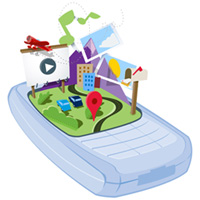
CES, the largest annual trade show for consumer gadgets, is quickly drawing to a close and I haven’t seen Google’s mobile OS make much of a showing. Although it has been only two months since it’s unveiling, I expected to see a handful of companies exhibiting at least early prototypes.
Considering this is an industry only show, and not open to the public, most companies show off products still in the early stages of development. Android’s release should have lit a fire under the metaphorical butts of handset developers everywhere, and CES is where these early stage efforts would first surface.
Keep reading for a quick Android refresher and more of my thoughts on Google’s mobile endeavors.
The Open Handset Alliance and Android
The Open Handset Alliance consists of over thirty companies in the mobile handset market space. Members are carriers, hardware makers, software developers and service providers.

These companies have banded together to foster an open environment where software for mobile platforms can be developed and deployed. The first project is dubbed “Android.” Android is a complete operating system and development platform for mobile devices.
Android will also contain many key mobile applications, such as contact management and mapping. The goal of Android is to create a level playing field for all developers, the idea being this will spur a cascade of high quality applications for the platform.
All applications developed for Android will have access to key phone hardware, such as calling capabilities and the camera. Also, third party application can utilize the bundled applications and re-purpose their functionality.
Google – The Ring Leader
Google’s contribution to this noble effort is the Android software itself and several of the key applications. Google’s software developers are also leading the charge technologically with an SDK, training videos, and sample applications.
Why Play Second Fiddle To The Poor Quality Applications Bundled With Most Handsets
I can imagine Google became frustrated with shoehorning crippled versions of their software onto other mobile platforms and decided to create their own. After all, why play second fiddle to the poor quality applications bundled with most handsets when you can take over the entire device? So far the early application demos are impressive, and quite Google-esque, something that couldn’t be achieved playing by Microsoft or Palm’srules.
Is This The Wind Of Change, Or Just Hot Air
I think many software developers (me included) are salivating at the possibility of easily rolling out versions of their applications for the mobile market. Let’s face it, even the best mobile browsers don’t cut the mustard, and developing Java or C applications requires in-depth knowledge of each device you want to deploy to.
Customers Have To Buy What They’re Selling, Even If It’s Junk
Android could usher in a new era in mobile devices, one where powerful devices and applications can live in your pocket. I want to emphasize could. The reality is carriers still control the last mile, and customers have to buy what their selling, even if it’s junk.
It wouldn’t surprise me if the first HTC Android device is an astonishing display of mobile technology, but T-Mobile cripples it, leaving customers with a watered down version of something great. Hopefully Google’s clout and market position can keep carriers inline, but I wouldn’t hold your breath.
Will The Real Android Please Stand Up
So the question remains; where are all the Android phones at CES? Only one relatively unknown Chinese phone maker made even a whisper of Android. They have a new phone on display that’s Android compatible, but isn’t actually running it yet. Maybe I am too optimistic, but I am surprised that a single Android compatible device is all that the industry could muster for the biggest event of the year.
I’m hoping this isn’t a sign of things to come, just my own overeagerness to see an actual Android phone in the wild. However, there is no doubt when Android devices start surfacing there will be an explosion of third-party software available, especially since Google is giving away ten million dollars to the developers who churn out the best applications.
Come on Google, ten million is the highest price you're willing to pay to dominate yet another market? I think ten billion is more appropriate.
Update:
Topics: